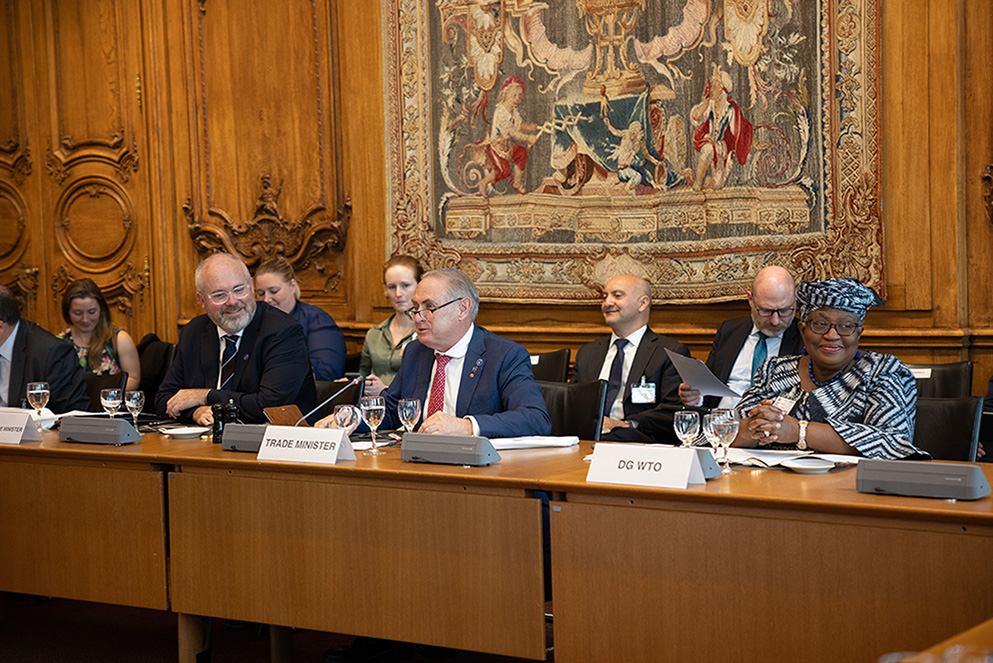DIRECTOR-GENERAL NGOZI OKONJO-IWEALA
More
In her address to the OECD Ministerial Council Meeting, the Director-General noted that trade has been a shock absorber through one crisis after another and an enabler of resistance. Nevertheless, “shortages and bottlenecks of the past three years have exposed genuine vulnerabilities in the way supply chains are organized,” she said. “Together with rising geopolitical tensions, this has spurred growing calls for re-shoring, near-shoring and friend-shoring.”
While some reshoring looks inevitable and businesses are already using the term “derisking” strategy, “letting re-shoring turn into a wider policy-induced retreat from trade would be costly and probably ineffective,” the DG warned.
“Costly because it would disrupt the US$ 31.4 trillion worth of global goods and services trade in 2022, equivalent to roughly 30 per cent of global GDP,” she noted. In addition, she noted, WTO researchers estimate decoupling into two separate economic blocs would reduce long-term real GDP by at least 5 per cent, with the IMF estimating it at up to 7 per cent. In comparison, the 2008–09 financial crisis lowered OECD countries' real incomes by 3.5 per cent.
Re-shoring could also make supplies even more concentrated, increasing vulnerabilities. Reduced cooperation on trade would make it harder to tackle global commons problems — adding risks to growth and sustainability, the DG said.
“A better path to resilience lies in deeper, deconcentrated and more diversified global chains, achieved by bringing more countries and communities from the margins of the global economy to the mainstream,” she told ministers. “At the WTO, we are calling this “re-globalization”.”
Some deconcentration is already happening as companies add suppliers in places like South East Asia, India and Mexico to reduce costs and manage risks. “We need to take this process further, to encompass parts of Africa, Latin America and Asia that are still on the margins,” the DG said.
For re-globalization to work, an open and predictable multilateral trading system centred on the WTO is a prerequisite. “That's why shoring up the WTO and keeping it fit for purpose is so important,” the DG added. “You and your colleagues took important steps forward last June at MC12 (the WTO's 12th Ministerial Conference). We need to keep this up en route to MC13 in Abu Dhabi next February.”
“And perhaps a bit of the brainpower and financing currently being devoted to re-shoring could instead be put towards the policy reforms and supply-side investments that would help bring marginalized places and people into global markets.”
While in Paris, the Director-General also participated in an informal gathering of WTO ministers on 7 June hosted by Australian Minister for Trade and Tourism Don Farrell. Ministers and senior officials from around 20 WTO members took part in the gathering to discuss preparations for MC13 and the elements needed to ensure the success of the meeting.
The Director-General also participated on 8 June in a meeting of the Ottawa Group of likeminded WTO members. The meeting was chaired by Mary Ng, Canada's Minister of International Trade, Export Promotion, Small Business and Economic Development.
During her stay in Paris, the Director-General also had meetings with Minister Farrell, Minister for International Development Cooperation and Foreign Trade Johan Forssell of Sweden, which currently holds the Presidency of the Council of the EU, and with European Commission Executive Vice-President and Commissioner for Trade Valdis Dombrovskis. She also met with European Commissioner for Environment, Oceans and Fisheries Virginijus Sinkevičius, the United Kingdom's Secretary of State for Business and Trade Kemi Badenoch, OECD Secretary-General Mathias Cormann and Liz Shuler, President of the American Federation of Labor and Congress of Industrial Organizations.
Share
Share
Problems viewing this page? If so, please contact [email protected] giving details of the operating system and web browser you are using.
